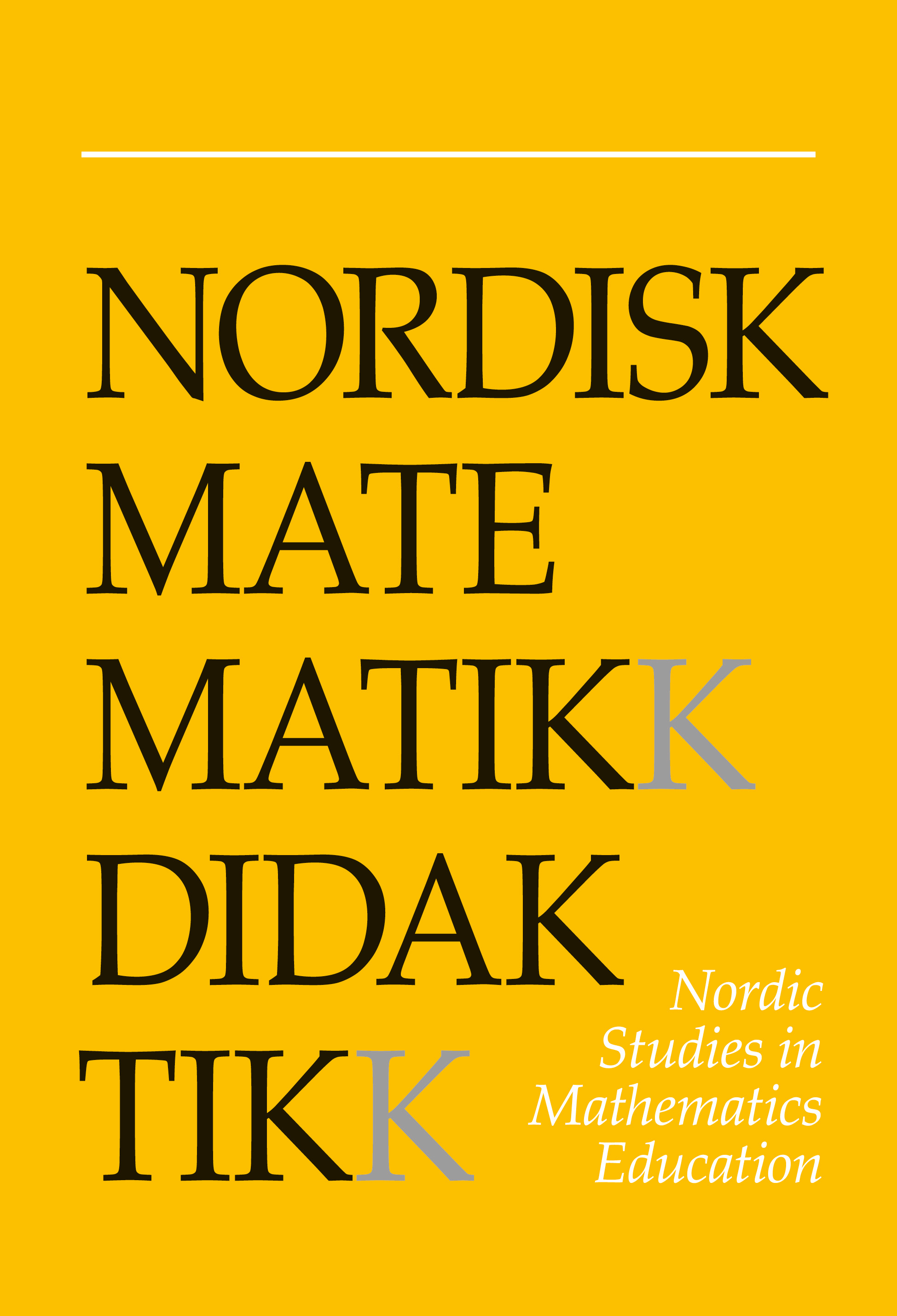School mathematical practices as experiences of identity work: the learning journeys of three students
DOI:
https://doi.org/10.7146/nomad.v20i2.148672Abstract
This paper illuminates, through stories, how three students’ school mathematical practices accumulate over the years into descriptions of identity in relation to school mathematics. The stories are based on semi-structured interviews with students who were successful during lower secondary school from the perspective of their mathematics teachers’ reform objectives and according to formal assessments. There was not, however, parallel successes in their personal identifications with the school mathematical enterprise as a whole. The study shows that, from the perspective of the student taking part in school mathematical practices, a sense of belonging to learning communities considered as legitimate is of uttermost importance.
References
Bassey, M. (1999). Case study research in educational settings. Maidenhead: Open University Press.
Bishop, J. P. (2012). "She's always been the smart one. I've always been the dumb one": identities in the mathematics classroom. Journal for Research in Mathematics Education, 43 (1), 34-74. https://doi.org/10.5951/jresematheduc.43.1.0034
Björklund Boistrup, L. (2010). Assessment discourses in mathematics classrooms [Ph. D. dissertation]. Stockholm University.
Björkqvist, O. (1993). Social konstruktivism som grund för matematikundervisning. Nordisk Matematikkdidaktikk, 1 (1), 8-17.
Black, L. (2004). Differential participation in whole-class discussions and the construction of marginalised identities. Journal of Educational Enquiry, 5(1), 34-54.
Black, L., Mendick, H. & Solomon, Y. (2009). Mathematical relationships in education. Identities and participation. London: Routledge.
Black, P. & Atkin, J. M. (Eds.). (1996). Changing the subject. innovations in science, mathematics and technology education. London: Routledge.
Boaler, J. (1997). When even the winners are losers: evaluating the experiences of "top set" students. Journal for Curriculum Studies, 29 (2), 165-182. https://doi.org/10.1080/002202797184116
Boylan, M. (2004). Questioning (in) school mathematics: lifeworlds and ecologies of practice [Ph. D. dissertation]. Sheffield Hallam University.
Carr, W. & Kemmis, S. (1994). Becoming critical. Education, knowledge and action research. Geelong: Deakin University Press.
Cobb, P., Gresalfi, M. & Hodge, L. L. (2009). An interpretive scheme for analyzing the identities that students develop in mathematics classrooms. Journal for Research in Mathematics Education, 40 (1), 40-68. https://doi.org/10.5951/jresematheduc.40.1.0040
Ewing, B. (2004). "Open your textbooks to page blah, blah, blah: so I just blocked off!". In I. Putt, R. Faragher & M. McLean (Eds.), Mathematics education for the third millennium: towards 2010 (pp. 231-238). Sydney: MERGA.
George, P. (2009). Identity in mathematics. Perspectives on identity, relationships, and participation. In L. Black, H. Mendick & Y. Solomon (Eds.), Mathematical relationships in education. Identities and participation (pp. 201-212). London: Routledge
Hodgen, J. & Marks, R. (2009). Mathematical "ability" and identity: a sociocultural perspective on assessment and selection. In L. Black, H. Mendick & Y. Solomon (Eds.), Mathematical relationships in education. Identities and participation (pp. 31-42). London: Routledge
Hossain, S., Mendick, H. & Adler, J. (2013). Troubling "understanding mathematics in-depth": its role in the identity work of student-teachers in England. Educational Studies in Mathematics, 84 (1), 35-48. https://doi.org/10.1007/s10649-013-9474-6
Kupari P. & Haapasalo L. (Eds.) (1993). Constructivist and curriculum issues in the Finnish school mathematics education. University of Jyväskylä.
Langer-Osuna, J. M. (2011). How Brianna became bossy and Kofi came out smart: understanding the trajectories of identity and engagement for two group leaders in a project-based mathematics classroom. Canadian Journal of Science, Mathematics and Technology Education, 11 (3), 207-225. https://doi.org/10.1080/14926156.2011.595881
Lutovac, S. & Kaasila, R. (2011). Beginning a pre-service teacher's mathematical identity work through narrative rehabilitation and bibliotherapy. Teaching in Higher Education, 16 (2), 225-236. https://doi.org/10.1080/13562517.2010.515025
Mellin-Olsen, S. (2009). Oppgavediskursen i matematikk. Tangenten, 2, 2-7.
Nardi, E. & Steward, S. (2003). Is mathematics T.I.R.E.D? A profile of quiet disaffection in the secondary mathematics classroom. British Educational Research Journal, 29 (3), 345-367. https://doi.org/10.1080/01411920301852
NVivo (2002). NVivo 2 for windows. Retrieved from http://www.qsrinternational.com/products_previous-products_nvivo2.aspx
Reay, D. & Wiliam, D. (1999). "I'll be a nothing": structure, agency and the construction of identity through assessment. British Educational Research Journal, 25 (3), 343-354. https://doi.org/10.1080/0141192990250305
Ruthven, K. (1987). Ability stereotyping in mathematics. Educational Studies in Mathematics, 18 (3), 243-253. https://doi.org/10.1007/BF00386197
Sfard, A. & Prusak, A. (2005). Telling identities: in search of an analytic tool for investigating learning as a culturally shaped activity. Educational Researcher, May (34), 14-22. https://doi.org/10.3102/0013189X034004014
Solomon, Y. (2007). Not belonging: What makes a functional learner identity in undergraduate mathematics? Studies in Higher Education, 32 (1), 79-96. https://doi.org/10.1080/03075070601099473
Simon, M. A. (1995). Reconstructing mathematics pedagogy from a constructivist perspective. Journal for Research in Mathematics Education, 26 (2), 114-145. https://doi.org/10.2307/749205
Stake, R. E. (1995). The art of case study research. London: SAGE.
Star, J. R., Smith III, J. P. & Jansen, A. (2008). What students notice as different between reform and traditional mathematics programs. Journal for Research in Mathematics Education, 39 (1), 9-32.
Utbildningsstyrelsen (1994). Grunderna för grundskolans läroplan. Helsingfors: Utbildningsstyrelsen.
Wenger, E. (1998). Communities of practice. Learning, meaning and identity. Cambridge University Press. https://doi.org/10.1017/CBO9780511803932
Wood, M. B. (2013). Mathematical micro-identities: moment-to-moment positioning and learning in a fourth-grade classroom. Journal for Research in Mathematics Education, 44 (5), 775-808. https://doi.org/10.5951/jresematheduc.44.5.0775
Yero, J. L. (2010). Teaching in mind: how teacher thinking shapes education. Hamilton: MindFlight Publishing.
Downloads
Published
How to Cite
Issue
Section
License

This work is licensed under a Creative Commons Attribution-NonCommercial-ShareAlike 4.0 International License.



